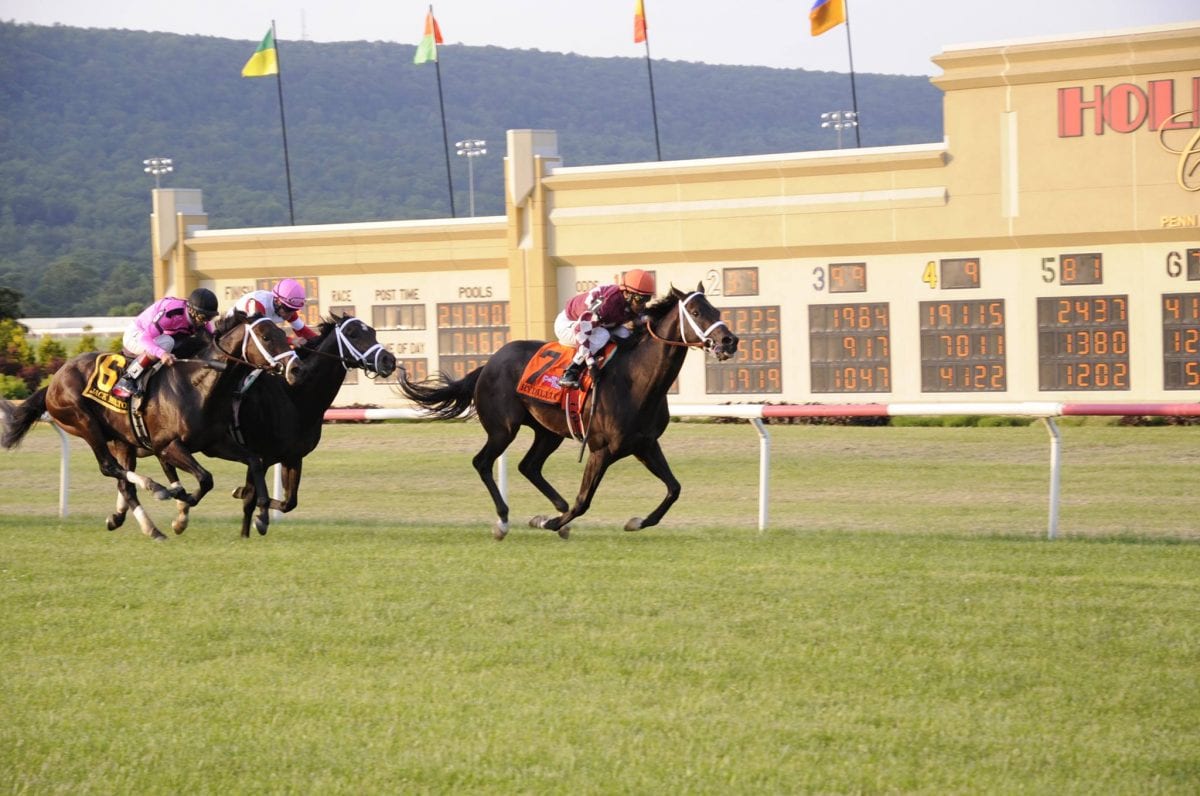by Frank Vespe
The news (here) that Pennsylvania’s declining slot revenues are impacting racing wasn’t exactly a “man bites dog” story.
“Like everyone shouldn’t have seen that coming,” one member of the Twitterverse observed.
With full-service casinos now available all over the mid-Atlantic, it’s no surprise that some of the early locations — and early games, as most states permitted slot machines before table games — are taking a hit now.
And, indeed, the hits keep on coming. According to the Pennsylvania Gaming Control Board, slot machine revenues have been down by at least 5.7 percent in each of the last three months.
[pullquote]According to the Pennsylvania Gaming Control Board, slot machine revenues have been down by at least 5.7 percent in each of the last three months.[/pullquote]A closer look at the numbers, however, reveals more than just declining slots revenue. It puts into stark relief not just the danger of relying on non-racing revenue to support purses but also the way the mixture of on- and off-track wagering impacts racing revenue. And it points out the challenges facing racing, in Pennsylvania and around the region (and nation).
Under Pennsylvania law, the Race Horse Development Fund, which funds purses, state-bred accounts, and other racing-related items for both the Thoroughbred and harness industries, receives what amounts to about 11 percent of slots revenue; that figure is inexact, however, because it’s based on slots play at racetrack casinos, though all casinos contribute.
As a result, while slots play statewide declined by about 3.5 percent, because of declining action at racinos, the amount going into the Fund fell by about 7 percent and the amount distributed to purses dropped by 6.6 percent.
With new competition — online gaming in New Jersey, two planned new casinos in Maryland — arising, the challenges for existing casinos (and thus for the Fund) figure to grow more daunting.
That’s lesson one: it’s dangerous to build a business model that’s dependent on someone else’s success.
What’s more, as much as people in racing might look at slots revenue carved out for the sport as “our money,” the only people making the decisions — politicians — don’t agree. To them it’s state money, which can be given or taken away.
In recent years in Pennsylvania, according to the Gaming Control Board, the state has taken amounts ranging from nothing at all (in, for example, 2009) all the way up to $68.8 million. In 2013, the state legislature directed $43 million from the Fund to other purposes — the lowest amount in the last four years.
Fights over the dollars in the Race Horse Development Fund have become an annual feature of the legislature, and, while observers don’t expect a recent proposal that would essentially zero out the Fund to go anywhere, it won’t likely be the last time it raises its head. Likewise, tracks in West Virginia and Maryland have had to fight to retain their share of slots funds in recent years.
All of that means that the industry’s lobbyists are now among its most important actors.
And even the good news in the report comes with a bit of a bitter aftertaste.
Handle on Pennsylvania’s racing rose about four percent in 2013 and is up nearly 40 percent since 2006. Good news, right?
Yet the amount that parimutuel handle contributes to purses actually declined by more than eight percent in 2013 — and is down over 40 percent since ’06. As a result, slots revenue in 2013 comprised more than 84 percent of purses earned — up from 77 percent on similar gross purses in 2008.
That’s because in recent years the mix of handle has shifted dramatically away from revenue generated on-track and in-state and towards that generated out-of-state. Even as total handle on the live product has risen to record levels, in-state wagering on the Pennsylvania product has declined — by nearly 30 percent since 2006, according to the Gaming Control Board report.
[pullquote]The industry’s lobbyists are now among its most important actors.[/pullquote]To promote the spread of simulcasting, track operators long ago agreed to let the bet-takers keep the lion’s share of simulcast dollars. Now, with advance deposit wagering rapidly taking market share from tracks and off-track wagering facilities, track operators are starting to rethink those arrangements.
“My sense is more and more tracks are taking a look at what they sell their product for,” Maryland Jockey Club president Tom Chuckas told The Racing Biz in March. “You have the responsibility to put on a product; is there a fair share coming from your simulcast partners? We still incur all the costs [of putting on the program]. So, is it fair? I think you’re going to see those rates go up.”
Accessing slots revenues has pumped big money into racing and breeding — more than $1.1 billion into Thoroughbred and harness purses and over $111 million into Thoroughbred breeding in Pennsylvania alone. The industry’s challenge, in Pennsylvania and in other states benefiting from slots, is to view those funds not as an endless source of wealth but as investment capital — money it can use to build a sustainable future.
And if racing can make that transition, can turn slots money into a better tomorrow?
Now, that would be a man-bites-dog tale.
(Featured image, of the 2013 Penn Mile, by B & D Photography.)












